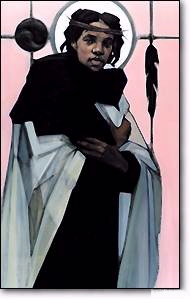Evangelical

I am Evangelical. I’ll be honest I’m still working through the full ramifications of that, and exactly what type of evangelical I am but this is an admission, I am Evangelical. I have been stewing over this the last several weeks that is since we got the definition of what an Evangelical is in our Christianity in
The Christian Life requires 180 degree conversion (this is the lowest common denominator), and this conversion has a definite emotional component in it. This particular one I struggle over a bit. I am one of those Christians who can’t tell you when I was not a Christian, I can’t point to a definite time and date and say, “Here this is where I was saved.” So for me I readily affirm that type of salvation but I do leave it open for continuous Christian life with multiple salvation points within it. I have posted previously of a salvation experience in
Evangelicalism has a high regard for biblical authority. My desire to hold the bible as authoritative takes precedent over such ideas as fundamentalism. I am NOT a fundamentalist and never will be. To borrow a statement from the Assemblies of God, the bible is the plumb line for faith and practice. In my opinion it doesn’t have to be factual to do so. I could care less who wrote what in the JEPD theory, I find it helpful to view scripture in this manner but it does not replace its centrality for me. While I admire the work of the Jesus Seminar I reject their conclusion about Christ and their placement of themselves in the picture of Christ (this may be a post for another time).
A concern for witnessing and evangelism. This means that we care about the eternal destination of those around us. I seek to share what Christ has done for me and how Christ has taught me to see the world. This does not mean brow beating!
Strong emphasis on sin/salvation. This in some ways is a little more difficult for me. Being Methodist I believe the image of God is not wiped out from humanity but I do believe that there is something inherently wrong within humanity. I believe that salvation in Christ goes a long way to rectifying this situation, however unfortunately the majority of our Brothers and Sisters stop there in the Christian life. I am a Wesleyan Methodist and that means some type of sanctification needs to be happening.
Once saved and individual will work for social well being and social action in the world. This is natural to me. You cannot hold the bible as authoritative on faith and practice and not see what God has to say on the poor and oppressed. This is not a tirade against wealth but that is another post I plan on making soon.
The end result is that I am solidly evangelical, I don’t know what variety but evangelical none the less.
Update: In Class today we reived the 5 tenents of Neo-Orthodoxy, these are me all the way, so it looks like I may be a Neo-Orthodox evangelical...I'll have to read more but so far this is the only thing that I agree with everything written here (these are done by George Richard)
1. The bible functions as the word of God when it is used by the churches to witness to God's redemptive work in Jesus Christ, who is the true Word. In order for this to happen the Holy Spirit must open the hearts and minds of the hearers of Scritprue. Apart from this use, the Bible in itself is a human book, written in humanly chosen and therefore imperfect words. It contains the biases, limitations, and prejudices of the people who wrote it. Nevertheless, God's providence was sufficiently active in its composition and redaction to inure that it can function as a reliable witness to God's redemptive act in Jesus Christ. Without this witness, we have no access to Jesus. Therefore, the bible, as used by the church through the illumination of the Holy Spirit, is our sole authority and infallible guide in essential matters of faith.
2. What exactly happened behind the Virgin Birth narratives is a mystery. It is essential for Christians to believe that the birth of Jesus did occure through the unique, creative act of God, and that through the birth of Jesus Christ the eternal Logos did enter the world. This is the essential point of the birth narratives. The historical mechanisms through which this transpired cannot be known and need not be known.
3. The crucificxion of Jesus is indeed the atoning act of God, through which God and man (sic) are reconciled. However, Jesus' death was not a "payment" made to appease the wrath of an angry God. Rather; the death of Jesus enacts God's solidarity with sinners in the midst of the deadliness and God-forsakenness of human guilt and alienation.
4. The stories of Jesus' resurrection point to an historical event, the exact nature of which cannot be known with any certainty. But we can know the essential point of these stories: that in Jesus God has conquered death itself, and that this conquest involves the preservation of our earthly, embodied identities.
5. The miracle stories in the New Testament express symbolically God's (including the incarnate God's) lordship over all natural processes and God's healing presence in, through, and over those processes. The truth of this theological conviction about God's lordship and healing intent does not depend on the exact historically factual nature of any of these stories.
As we can tell when you compare what I wrote one evangelicalism and here that I line up...yeah!
Comments